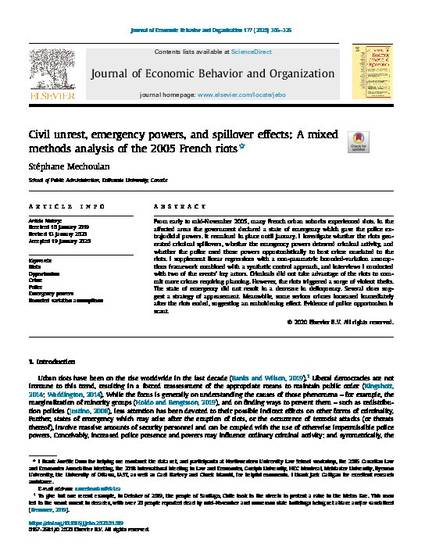
Article
Civil Unrest, Emergency Powers, and Opportunism: a Mixed Methods Analysis of the 2005 French Riots
Journal of Economic Behavior and Organization
(2020)
Abstract
From early to mid-November 2005, many French urban suburbs experienced riots. In the affected areas the government declared a state of emergency which gave the police extrajudicial powers. It remained in place until January. I investigate whether the riots generated criminal spillovers, whether the emergency powers deterred criminal activity, and whether the police used those powers opportunistically to bust crime unrelated to the riots. I supplement linear regressions with a non-parametric bounded-variation assumptions framework combined with a synthetic control approach, and interviews I conducted with two of the events’ key actors. Criminals did not take advantage of the riots to commit more crimes requiring planning. However, the riots triggered a surge of violent thefts. The state of emergency did not result in a decrease in delinquency. Several clues suggest a strategy of appeasement. Meanwhile, some serious crimes increased immediately after the riots ended, suggesting an emboldening effect. Evidence of police opportunism is scant.
Keywords
- riots,
- emergency powers,
- France,
- 2005,
- opportunism,
- bounded variation assumptions
Disciplines
Publication Date
Summer 2020
Citation Information
Stéphane Mechoulan. "Civil Unrest, Emergency Powers, and Opportunism: a Mixed Methods Analysis of the 2005 French Riots" Journal of Economic Behavior and Organization Iss. 177 (2020) p. 305 - 326 Available at: http://works.bepress.com/stephane_mechoulan/24/
